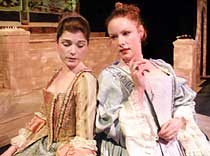Seventeenth-century France, under the rule
of the "Sun King," Louis XIV, was a time when the arts
flourished and the aristocracy frolicked. Gathered around the
king in his palace in Versailles or back in their Parisian homes,
the rich devoted themselves to courtship, entertainment and petty
rivalry. Character took a backseat to dress, education and even
the way one bowed.
Jean Baptiste Poquelin Moliere’s "The Misanthrope,"
now on stage at the Gallery Players, is a biting attack on the
hypocrisy of this society. But, some say, the play, inspired
by Moliere’s unhappy marriage to Armande Bejart, is also a broad
condemnation of humanity, prone as it is to lies, flattery and
witlessness.
Although Moliere (1622-1673) always wrote about "real"
people – peasants, noblemen, servants, bourgeoisie – his characters
were mostly types and caricatures. They drew their reality and
their strength from the societies in which they lived. So Gallery
Players director Yvonne Opffer Conybeare was wise to leave "The
Misanthrope" set in 17th-century France.
Michael Kramer has set the stage exquisitely with his rendition
of the courtyard of a fashionable Paris home, complete with stone
walls, steps and even a fountain. And Christopher Anthony Vergara
makes excellent use of the wardrobes of the Juilliard School
and the Pearl Theater; his costumes are worthy of the Comedie
Francaise.
Add to this the training on Baroque movement donated by Janice
Orlandi of the Actors Movement Studio, and even the most exacting
scholar of this period would find little to fault in this production.
The Gallery Players have used the excellent verse translation
of poet Richard Wilbur, who has the rare ability to make rhymed
couplets sound like plausible conversation. And this cast, with
its perfect enunciation, makes Wilbur’s verse a pleasure to hear.
Andrew Firda plays Alceste, the misanthrope who is disgusted
with the lies and flattery that surround him and vows to speak
only the truth. Unfortunately, Alceste is in love with Celimene,
a frivolous and faithless flirt who epitomizes everything he
despises.
Christopher Johnson makes his first appearance with the Gallery
Players as Alceste’s friend and confidante, Philinte, who is
also amorous of the unworthy Celimene.
Add to the mix John Blaylock ("Deathtrap," "Someone
Who’ll Watch Over Me," "Sleuth") as the sonnet-spouting
Oronte, Heather Siobahn Curran (who directed this season’s "Deathtrap")
as the pretentious prude Arsinoe, and Dana Bennison as the sweet
and sincere Eliante, who is attracted to both Alceste and Philinte,
and there’s enough material for several love triangles.
But Moliere, who leaves no holds barred when making his point,
also presents the audience with Clitandre (Evangelos Alexiou)
and Acaste (Colin Pritchard), two of Celimene’s suitors, who
outdo each other in their ability to engage in meaningless gossip.
Of special note is Ron Nahoss’ hilarious buffoonery in his cameo
as the Guard of the Marshalsea, who comes to warn Alceste that
his case in court has not gone well and he’d better leave town
in a hurry.
With war in the Persian Gulf, recession at home and terrorism
here and abroad, one might think there are more important things
to worry about than whether men are totally truthful and women
are totally faithful. But don’t be fooled. That is precisely
what Moliere is getting at.
Alceste, the misanthrope, is every bit as foolish as the fops
and flirts he mocks. His honesty is his own form of pride, and
his inability to recognize true virtue in people like Philinte
and Eliante is his own blindness. This is not a man of any more
substance than the people he scorns.
Deeply rooted in their times, Moliere’s plays nevertheless have
a very real sense of the true value of life and thus transmit
a universal message. Although Moliere was most definitely influenced
by Italianate farce and comedies of intrigue, his innovation
was to develop a comedy based on his observation of human nature
with all its foibles resulting in comedies that have the lasting
impact of more serious drama.
The Gallery Players have succeeded in conveying the genius that
has made Moliere the father of modern French comedy, indeed,
much of modern comedy in the Western world.
The Gallery Players’ production of
"The Misanthrope" plays through April 13 – Thursdays,
Fridays and Saturdays at 8 pm and Sundays at 3 pm – at 199 14th
St. at Fourth Avenue in Park Slope. Tickets are $15, $12 seniors
and students. For reservations, call (718) 595-0547.

























